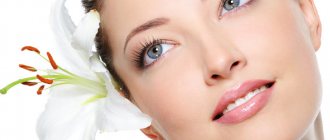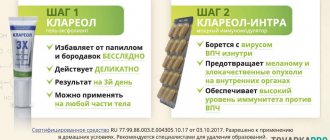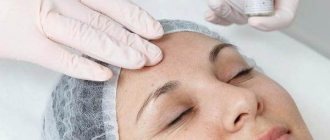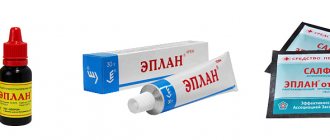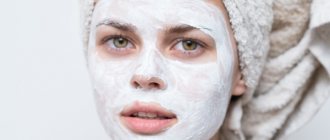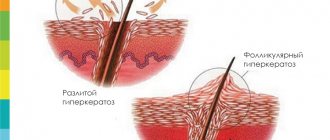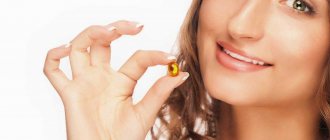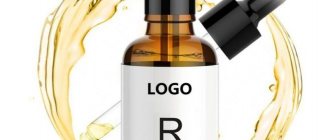Nosological classification (ICD-10)
- A09 Diarrhea and gastroenteritis of presumably infectious origin (dysentery, bacterial diarrhea)
- A15-A19 Tuberculosis
- B05 Measles
- E50 Vitamin A deficiency
- E50.0 Vitamin A deficiency with conjunctival xerosis
- E50.4 Vitamin A deficiency with keratomalacia
- E50.5 Vitamin A deficiency with night blindness
- E55.0 Active rickets
- H01.1 Non-infectious dermatoses of the eyelid
- H10.1 Acute atopic conjunctivitis
- H10.9 Conjunctivitis, unspecified
- H16 Keratitis
- J04 Acute laryngitis and tracheitis
- J06 Acute upper respiratory tract infections of multiple and unspecified localization
- J18 Pneumonia without specifying the pathogen
- J20 Acute bronchitis
- J22 Acute respiratory infection of the lower respiratory tract, unspecified
- J39.9 Upper respiratory tract disease, unspecified
- J42 Chronic bronchitis, unspecified
- J44.9 Chronic obstructive pulmonary disease, unspecified
- K20 Esophagitis
- K25 Stomach ulcer
- K26 Duodenal ulcer
- K29.5 Chronic gastritis, unspecified
- K29.9 Gastroduodenitis, unspecified
- K52 Other non-infectious gastroenteritis and colitis
- K74 Fibrosis and cirrhosis of the liver
- L11.0 Acquired keratosis follicularis
- L30.9 Dermatitis, unspecified
- L40 Psoriasis
- L44.0 Pityriasis red hairy pityriasis
- Q80 Congenital ichthyosis
- T14.1 Open wound of unspecified body area
- T30 Thermal and chemical burns of unspecified location
- T33-T35 Frostbite
Retinol for facial skin: reviews
The beneficial properties of retinol for the face have been well studied and confirmed by many positive reviews. Some of the main benefits of vitamin A include:
- strengthening collagen synthesis and protecting it from premature damage - as a result, small wrinkles disappear, and large wrinkles noticeably decrease;
- accelerating cell regeneration, making the skin smooth and the complexion uniform and attractive;
- preventing processes associated with skin pigmentation, which also has a good effect on facial skin tone.
Interestingly, almost all reviews about the use of retinol to restore facial skin are positive. It is recommended by more than 95% of buyers. Among the advantages are a completely natural composition, the absence of contraindications and side effects, a real effect, and an affordable price.
Vitamin A is good not only for the skin (including dry skin), but also for the hair and mucous membranes. Moreover, after 1-2 weeks the face looks more attractive.
In rare cases, individual shortcomings are also mentioned, for example, individual intolerance to retinol. Sometimes called side effects and a small volume of the bottle. Buyers are also warned of the need to follow the instructions to prevent an overdose.
Composition and release form
| Oral solution | 1 ml |
| retinol palmitate | 100000 IU |
| (1 drop of solution from a dropper or eye dropper contains 3300 IU) | |
| 1 mg of retinol palmitate corresponds to 1817 IU | |
| excipients: butylated hydroxytoluene; butylated hydroxyanisole; rapeseed oil |
in dark glass bottles of 10 ml; in a cardboard pack 1 bottle or in dark glass bottles of 10 ml, complete with a dropper; 1 set in a cardboard pack.
Description of the drug
Retinol is A. It is available in the form of an organic salt - retinol palmitate. In appearance it is an oily liquid of light yellow color. The content of the active ingredient is 100 thousand IU per 1 ml. Packaged in bottles of different sizes (from 10 ml).
Vitamin A is a vital substance that performs several functions:
- participation in tissue metabolism;
- synthesis of proteins, individual carbohydrates and lipids;
- participation in oxidation-reduction reactions;
- cholesterol synthesis;
- normalization of the function of the sebaceous, sweat, lacrimal glands;
- stimulation of cell division processes (regenerative processes);
- adaptation of vision in the dark.
The substance is well absorbed by the intestinal mucosa and enters the bloodstream, then enters the tissues and at the end of the cycle is processed by the liver.
Store the solution with vitamin A only in the refrigerator or in another dark place at a temperature of no more than +10°C. Access by children should be excluded. The solution must be used within the expiration date of 2 years from the date of production.
Indications for the drug Retinol palmitate
Vitamin A deficiency (hypo- and avitaminosis A); eye diseases (retinitis pigmentosa, xerophthalmia, hemeralopia, keratomalacia, conjunctivitis, eczematous lesions of the eyelids), skin diseases accompanied by dryness and delayed epithelization (ichthyosis, ichthyosiform erythroderma, psoriasis, variable erythrokeratoderma, keratoderma, lichen planus pilaris (Devergie's disease), acne, seborrhea, hair diseases, neurodermatitis, follicular keratosis, superciliary ulerythema, baldness, burns, wounds, frostbite, epidermolysis bullosa, congenital pachyonychia, leukoplakia, familial benign pemphigus Hailey-Hailey, Darier's follicular dyskeratosis), skin tuberculosis; infectious and colds (measles, pneumonia, dysentery, tracheitis, bronchitis, acute respiratory infections), rickets, malnutrition, erosive gastroduodenitis, gastric and duodenal ulcers, cirrhosis of the liver (as part of complex therapy).
Indications and contraindications
Reception is indicated for deficiency or absence (vitaminosis) of vitamin A. The drug is also used as an additional medicine for the treatment of such pathologies:
- cirrhosis of the liver;
- ulcerative lesions of the gastrointestinal tract;
- xerophthalmia and other eye diseases;
- eyelid skin lesions (eczema);
- skin diseases (including rash, eczema, seborrheic dermatitis, tuberculosis, psoriasis);
- bronchitis;
- ARVI, including influenza;
- dysentery infection.
It is not allowed to use retinol if there is an excess of vitamin A, as well as with the following pathologies:
- gallstones;
- pancreatitis (chronic form);
- inflammation of the skin.
The drug should be used with caution in case of viral hepatitis of any type, insufficiency of heart or kidney function, as well as in case of nephritis. In these cases, a preliminary consultation with a doctor is indicated.
Side effects
Rarely - manifestations of hypervitaminosis A: in adults - drowsiness, lethargy, headache, facial flushing followed by peeling, nausea, vomiting, possible exacerbation of liver disease, gait disturbance, pain in the bones of the lower extremities; in children - short-term increase in body temperature, drowsiness, increased sweating, vomiting, skin rashes. Increased intracranial pressure (infants may develop hydrocephalus, protrusion of the fontanel).
With a dose reduction or temporary discontinuation of the drug, side effects disappear on their own. In some cases, on the first day of use, itchy maculopapular rashes may occur, requiring discontinuation of the drug.
When high doses are prescribed for skin diseases, after 7–10 days of treatment, an exacerbation of the local inflammatory reaction is observed, which does not require additional treatment and subsequently decreases. This effect is associated with the myelo- and immunostimulating effects of the drug.
Retinol - the vitamin of youth
Hello beauties!
Today I would like to dedicate my post to vitamin A.
Having sifted through a bunch of information on the Internet and watched a lot of videos, I want to share it with you. Winter is exactly the time when you should think about facial care with retinols, so that in the summer you can stop masking your imperfections.
Let's start.
Probably, as long as our planet rotates, humanity will continue with undying enthusiasm the centuries-old search for the elixir of eternal youth, beauty and health. To maintain such precious gifts of Nature as beauty, health and youth, “scientific minds of our time” are developing more and more new cosmetics and introducing innovative technologies. It has been scientifically proven that vitamins are a vital element for the full functioning of the human body. The balance of the “vitamin alphabet” allows you to maintain and preserve beauty and health for many years. Nowadays, quite often the beauty industry offers the use of retinol – true vitamin A – as an anti-aging therapy.
Vitamin A
recognized as one of the main vitamins of youth and beauty, due to its pronounced antioxidant properties. The use of vitamin A guarantees healthy and beautiful hair, strong nails, increased immunity, improved blood circulation, strengthened blood vessels and stable metabolism. Initially, in cosmetology, retinol was used to treat skin diseases such as acne, pimples and other rashes. Based on this practice, the rejuvenating effect of vitamin A was noted - smoothing out fine wrinkles, improving skin texture, etc. After a series of long-term clinical and laboratory studies, retinoids (retinol acetate, retinol palmitate, retinolic acid) began to be included in not only medicinal but also cosmetic products.
Cosmetics containing retinol have the following advantages:
• Thanks to the ability to penetrate into the deep layers of the skin (the location of collagen and elastin), it helps maintain the firmness and elasticity of the skin, stimulates the growth and restoration of skin cells - an excellent and clearly expressed anti-aging therapy.
• The use of retinol-containing cosmetics allows you to fight expression lines and even deep wrinkles, improve complexion and even out skin texture, get rid of age spots, etc.
• Vitamin A is actively used to treat acne - it reduces the activity of the sebaceous glands (regulates the process of sebum secretion), accelerates the process of skin renewal, fights inflammatory elements and promotes the healing of wounds and scars after acne. For problem skin, retinol can be used both internally - in the form of an oil solution or pharmaceutical preparations (tablets) with a certain concentration of retinol, and externally - ointments, creams or gels.
• Retinol is one of the best anti-aging and restorative components of cosmetics, the effect of which has been proven and is already undeniable.
• The action occurs in two directions - desquamation (that is, exfoliation) and proliferation (cell division and growth), i.e. They thin the stratum corneum of the skin and thicken the epidermis. Therefore, retinol-based products simultaneously cleanse the skin of acne and age spots, smooth, renew and restore.
Side effects of retinol:
• In excessively high concentrations it can have a toxic effect on the body. Before you start using vitamin A (retinol), it is recommended to consult a doctor or highly qualified cosmetologist.
• May cause increased skin sensitivity to ultraviolet rays (photosensitization). In this regard, the use of cosmetics with vitamin A requires the use of sunscreens with a high SPF factor.
• The use of retinol is not recommended during pregnancy (especially in the first 3 months) and breastfeeding - there is no definitive research data on the effect of retinol on the fetus.
• Please note that using retinol may cause skin reactions such as flaking, redness, swelling and dryness (retinoic dermatitis).
Can only
at night or in the evenings, but not under cosmetics. Skin receptors are most sensitive to retinol at night, and besides, in the light, retinol completely loses its properties. This is probably the most important point of all today. This is indeed a very effective ingredient in anti-aging skin care lines, but if used incorrectly, the consequences can be far from happy.
Rules for using retinol for the face:
— Retinol is a very unstable product. When exposed to light and air, it oxidizes very quickly, so if you are thinking of buying this vitamin in liquid form, always choose capsules rather than bottles. Of course, you need to store it in a dark place.
— Retinol makes the skin more sensitive to the sun and ultraviolet rays, therefore, while using products with vitamin A, you must use Sunscreen or cream with a high level of protection during the day (at least SPF15 is recommended, but SPF30 and higher is better).
— If you are going to use retinol for the first time, then it is better not to do it every day. First 1-2 times a week, then more and more often, so that the skin has time to get used to it.
— For those whose facial skin is very sensitive, it is better to completely abandon the cream with retinol. She simply cannot stand it, this is a very powerful remedy. Some manufacturers offer creams with a more gentle formula, especially for sensitive skin, but everything is individual, and the reviews are very mixed, although mostly positive.
— Almost always, after the first use of a cream with retinol, red spots and a feeling of tightness of the skin appear. We need to continue using it. Usually after 1-2 weeks the skin gets used to it and everything returns to normal. If this does not happen, then your skin is sensitive to it and you should completely avoid cosmetics with retinol.
— Retinol should be used with caution on dry facial skin. Judging by the reviews, the skin condition worsens after use. In such cases, experts recommend using products with retinol a couple of times a week, no more, and take care of intensive skin hydration.
— It’s better to start using a cream with retinol in the fall and winter. Retinol increases skin sensitivity to ultraviolet radiation and it is better to minimize the risks.
— Retinol is mainly recommended for those who are already over 30, 35 and older. Many people believe that it can only harm young skin, but do not forget that the most effective acne treatments are also based on retinol, and they are used specifically on young skin. In addition, many manufacturers are already moving away from separating products by age; now it is believed that you need to use those products that your skin needs. For some, wrinkles appear after 25, while for others they are not visible even at 40.
What products can you combine retinol with for the effect of renewed, smooth skin?
It is very important to remember that retinol is hygroscopic, i.e. can dehydrate the skin, so it is necessary to combine its use with moisture-retaining products rich in hyaluronic acid or gluconolactone (moisturizes, activates the keratinization process, helps improve skin quality, has a lifting effect, lingers in the stratum corneum, providing long-term hydration, does not have an irritating effect, has excellent antioxidant properties, quickly restores the skin, has an anti-acne effect). Their use should be included in daily morning care, and at least once a week it is necessary to apply a deeply moisturizing mask. Due to its renewing ability, retinol is ideal as a conductor for the absorption of the active ingredients of products combined with it.
The best results were seen when it was combined with vitamin C, that is, retinol at night, vitamin C in the morning.
An approximate model of anti-aging daily skin care with a course of retinol would look like this:
Morning:
cleansing + antioxidant moisturizer with vitamin C + SPF
Evening:
cleansing + retinol (2 – 3 times a week)
The main disadvantage of retinol:
Use, even in a small percentage, is prohibited for pregnant women, lactating women, and also when preparing for pregnancy. No matter what they tell you, you shouldn’t experiment with teratogenic components of cosmetics at such a crucial moment in life.
Creams containing retinol (brand and name):
1. MD Formulations:
Vit-A-Plus Illuminating Serum
2.
Holy Land Cosmetics: Alpha-Beta & Retinol Day Defense Cream SPF-30
3.
Holy Land Cosmetics: Alpha-Beta & Retinol Restoring Cream
4.
ROC: RETINOL ACTIF PUR Anti -Wrinkle Moisturizing Treatment Day
5.
SkinCeuticals: RETINOL 0.3
6.
Vichy: Reti C Soin Correcteur Intensif Jour
7.
Faberlic: Aquaftem
8.
Garnier: Retinol+Vitamine C Actifs Purs
9.
Magiray: “Camellia”
10.
Magiray: LiftoFin Mask
11.
Anna Lotan Laboratories: Solid Gold
12.
Darphin: ArovitA
13.
Christina Professional Cosmetics: Active nigt eye cream
14.
Dr. Taffi: Cream 12%
15.
Decleor: Vitaroma re-sourcing emulsion lift contour et rides
16.
Lumene: Retinol night revitalizer
17.
Anna Lotan Laboratories: Rebalanse
18.
Avon: ANEW ULTIMATE Eye Cream
19.
MD Formulations: Retin-a complex for men
20.
MD Formulations: Men complex
21.
Avon: ANEW ULTIMATE Skin Transforming Cream
22.
Neutrogena: Anti-Cellulite Treatment Retinol Formula
23.
Neutrogena: Healthy Skin Anti-Wrinkle Intensive Night Cream
24.
Avon: Anew ultinate Eye Cream
25.
ROC : Hydra + Vitamines Actives
26.
Babor: Skinovage
27.
Lyseidia: Botoderm
28.
Estee Lauder: Diminish Anti-Wrinkle Retinol Treatment
29.
SkinCeuticals: Retinol 0.5 Refining Night Cream with 0.5% Pure Retinol
30.
Strength Refining: Night Cream with 1.0% Pure Retinol
31.
Philosophy: Eye believe, deep wrinkle peptide gel
32.
Alpha Hydrox Retinol: Night ResQ
33.
Paula's Choice: Super Antioxidant Concentrate
34.
Pharmaceutical research and production enterprise "Retinoids": Retinoic ointment (in the form of isotretinoin) is sold in pharmacies
35.
Life Flo Health: Retinol A 1% Advanced Revitalization Cream
36.
Chantecaille: Retinol Intense Cream
37.
Dr. Dennis Gross: Ferulic & Retinol Anti-Aging Moisturizer
38.
Kate Somerville: RetAsphere 2-in-1 Retinol Night Cream
39.
Lancer Skincare: Advanced C Radiance Cream
40.
Philosophy: Help Me Retinol Night Treatment
41.
StriVectin: AR Advanced Retinol Night Treatment
And let's add some photos:
All information was taken from the Internet (I have no experience using these creams). I hope it was at least a little useful to you. Always be beautiful.
Thanks for reading. I am Tatyana.
Increase
Directions for use and doses
Inside, after eating early in the morning or late in the evening.
For mild to moderate vitamin deficiency: adults - up to 33,000 IU/day; children - 1000–5000 IU/day depending on age.
For eye diseases (hemeralopia, xerophthalmia, retinitis pigmentosa): adults - 50,000–100,000 IU/day and at the same time 0.02 g of riboflavin.
For skin diseases: adults - 50,000–100,000 IU/day; for acne and ichthyosiform erythroderma - 100,000–300,000 IU/day. Children are prescribed at a rate of 5000–10000 IU/kg per day.
In gastroenterology - 50,000 IU per day.
Single doses of retinol palmitate for adults should not exceed 50,000 IU and for children - 5,000 IU. Daily doses for adults are 100,000 IU and for children - 20,000 IU.
Top 6 best creams
- Cream Skin Ceuticals “Retinol 0.3”. The percentage of vitamin content is 0.3. Suitable for delicate skin around the eyes.
- La-Roche-Posay cream. Similar to the previous option.
- Super Retinol 0.5% is a more concentrated and active product.
- Skin Ceuticals "Retinol 1.0". This cream should be applied to the face, avoiding the eye area due to the high concentration of vitamin A, to avoid irritation.
- Multi-Action Serum.
